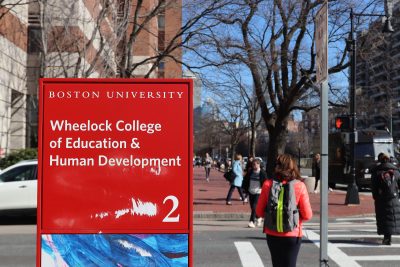
Boston University Wheelock College of Education and Human Development has eliminated eight staff positions, eight full-time faculty positions and 64 part-time faculty positions for the upcoming semester, as indicated in a memo sent from Wheelock’s Office of the Dean on Monday.
The memo, part of which was posted publicly on Twitter by the Unionized Massachusetts Higher Education Faculty, included the results of the 2021 fiscal year budget reduction and updates on workplace adjustment requests, as well as plans and changes for the Fall semester.
In a June 29 update on BU finances, President Robert Brown had highlighted the $96 million added budget cuts that needed to be identified as part of the financial shortfall of the University for the upcoming fiscal year.
Wheelock was asked by the University to reduce its budget by 15 percent, which approximates to around $2.2 million. One-third of the budget cuts were allowed to be “one-time” cuts, which may be filled again at a later date, while the remaining two-thirds of cuts must remain permanent.
Dean of Wheelock College David Chard said these decisions were not made lightly. He said the proposal created to meet the budget reduction included considerations about the faculty composition at Wheelock, as well as the school’s student enrollment rates.
“We’ve seen decreasing enrollments in certain programs,” Chard said. “So our plan was to reduce the faculty in those programs and take advantage of faculty vacancies.”
Chard said it’s important to note that these were position eliminations and not necessarily personnel. Some of them were vacant and had been previously hiring, and so do not equate to the actual number of people laid off.
Four out of the eight eliminated staff positions and five of the eight full-time faculty positions eliminated were vacant. The 64 part-time faculty positions that were eliminated could potentially be reopened for hiring in fiscal year 2022, barring budget restrictions.
All departments lost positions, Chard said, but the Office of Student Affairs was most affected. Yet it remains the biggest department at Wheelock, with 6 employees and one associate dean.
Ellen Faszewski, a clinical professor at Wheelock, is the associate dean leading the Student Affairs team. She wrote in an email that the cuts are a great loss.
“Over the last two years, I have had the pleasure of working with a highly skilled, motivated, and dedicated team,” Faszewski wrote. “Losing members of this ‘Dream Team’ has impacted all of us. Deeply.”
Faszweski wrote that despite the turn of events, Student Affairs remains committed to its students and will continue to provide high-quality support.
“When the merger occurred, there was a large degree of chaos, uncertainty, change, etc.,” Faszewski wrote, referring to when BU absorbed Wheelock College in 2018. “Working through all of that only made us more successful, supportive, and effective as a team. Luckily, we are able to rely on these qualities during this current period of change.”
Chard, who was the president at Wheelock College during the BU buyout, also said the loss of faculty and staff was impactful.
“Eliminating positions involves very difficult decisions that result in people we value and care about leaving us,” Chard wrote in the released memo. “We all wish these changes were not necessary.”
He said it’s been difficult for the entire college to have to experience something similar to what they did during the merger.
“Forty, 45 percent or so of faculty and staff at Wheelock College [had been laid off],” Chard said. “This brings back deja vu for many of us who are going through it again, so we know how difficult it is.”
Future cuts are possible, Chard said, and are dependent primarily on the rate at which students return to campus in the Fall, as the school relies on student tuition to operate. Significant decreases in tuition may mean some programs must be put on hiatus or discontinued altogether.
Gleny Burgos, executive director of operations at Wheelock, wrote in an email that BU is providing support to those who were laid off.
“The Faculty and Staff Assistance Office (FSAO) is available to assist the individuals affected by providing an array of services,” Burgos wrote. “Additionally, the university is offering transition and outplacement support to those impacted.”
Looking toward Fall, Chard said certain adjustments, such as a reorganization of faculty roles, will have to be made to help the school streamline its operations.
“We are looking carefully at the way we did work in the past to see if there are areas where there was redundancy,” Chard said. “We’re hoping to cross-train people so that they can be not necessarily working in a particular siloed area, but rather more flexibly working across areas.”
Chard said the school is also looking to further involve faculty in student recruitment efforts, especially as faculty members know the school’s programs best and have a higher chance of sparking a potential applicant’s interest.
Roughly one-third of faculty at Wheelock submitted a workplace adjustment request, Chard said. Most of them come from faculty who are in the U.S. Centers for Disease Control’s high-risk category, and they will be prioritized.
Valentin Voroshilov, a lecture coordinator in the Physics department at the College of Arts and Sciences, wrote in an email he thinks BU did not need to lay off people to survive financially.
“My approach would be to check what capital is used for — buildings, new buildings, parking lots, other structures,” Voroshilov wrote, “and find the way to freeze or cut some of those before starting cutting off people.”
Voroshilov also wrote the University should try to attract more students by lowering tuition by 20 percent for all online courses, advertising examples of high-quality teaching and giving more voice to faculty who tend to earn positive student feedback.
“I do not believe the administration has really innovative ideas, or people who can think outside the box and [are] willing to take a risk,” Voroshilov wrote.




























































































































